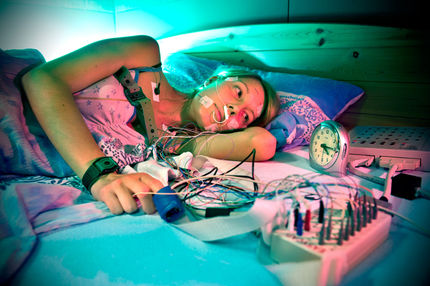Future hospitalization may be linked to insomnia
Having trouble falling or staying asleep? According to a new study led by a team of researchers at the Johns Hopkins Bloomberg School of Public Health, insomnia may be an important indicator of future hospitalization among middle-aged and older adults. They examined the association between insomnia and use of home healthcare services, nursing homes and hospitalization and found that insomnia symptoms experienced by middle-aged and older adults were associated with greater future use of costly health services.
"In a large representative sample of US middle-aged and older adults, we found that individuals with a greater number of insomnia symptoms were more likely to be hospitalized, and to use home healthcare services," said Adam Spira, PhD, senior author of the study and an assistant professor with the Bloomberg School's Department of Mental Health. "Over 40 percent of our sample reported at least one insomnia symptom, consistent with previous studies that showed insomnia to be very common in this population. If the association between insomnia symptoms and health service utilization is causal, our findings would suggest that the prevention of insomnia could decrease health service use by 6-14 percent in this population."
According to the National Institutes of Health, insomnia is the most common sleep complaint at any age and affects almost half of adults ages 60 and older. Insomnia symptoms include difficulty falling asleep, staying asleep, or both, and individuals with insomnia often report getting too little sleep, having poor sleep quality and not feeling refreshed when they wake up.
Lead author, Christopher Kaufmann, MHS, and his colleagues examined the association between insomnia symptoms and reports of health service utilization using data from the Health and Retirement Study. Participants were asked how often they experienced trouble falling asleep; trouble with waking up during the night; trouble with waking up too early and not being able to fall asleep again, and how often they felt rested when they woke up. Researchers evaluated health care utilization in 2006 and respondents were asked questions about their use of several health services two years later, including whether they were hospitalized, used home health care services, or were placed in a nursing home. Participants' demographic characteristics as well as current or previous medical conditions were also recorded.
"We found that there was a statistically significant relationship between the report of insomnia symptoms and the future use of costly health services. A relationship was even found between insomnia symptoms and hospitalization as well as use of any of the three health services after accounting for common medical conditions and elevated depressive symptoms," said Kaufmann, a doctoral student with the Bloomberg School's Department of Mental Health. "These results suggest that treating and carefully monitoring insomnia symptoms in middle-aged and older adults might somewhat reduce the use of health services and presumably the poor health outcomes that necessitate these services."
Original publication
Christopher N. Kaufmann, Sara L. Canham, "Insomnia and health services utilization in middle-aged and older adults: Results from the Health and Retirement Study," Journal of Gerontology: Medical Sciences, 2013
Most read news
Original publication
Christopher N. Kaufmann, Sara L. Canham, "Insomnia and health services utilization in middle-aged and older adults: Results from the Health and Retirement Study," Journal of Gerontology: Medical Sciences, 2013
Organizations
Other news from the department science

Get the life science industry in your inbox
By submitting this form you agree that LUMITOS AG will send you the newsletter(s) selected above by email. Your data will not be passed on to third parties. Your data will be stored and processed in accordance with our data protection regulations. LUMITOS may contact you by email for the purpose of advertising or market and opinion surveys. You can revoke your consent at any time without giving reasons to LUMITOS AG, Ernst-Augustin-Str. 2, 12489 Berlin, Germany or by e-mail at revoke@lumitos.com with effect for the future. In addition, each email contains a link to unsubscribe from the corresponding newsletter.






















































